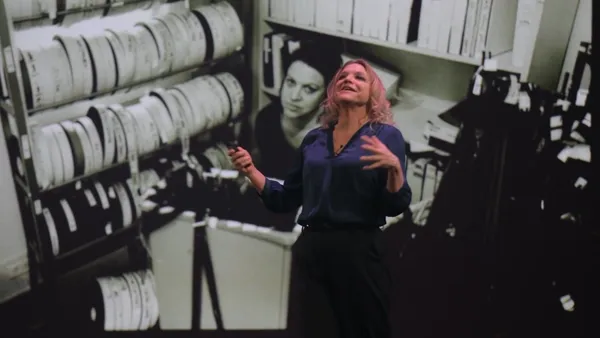Eye For Film >> Movies >> Brainwashed: Sex-Camera-Power (2022) Film Review
Brainwashed: Sex-Camera-Power
Reviewed by: Jennie Kermode

If you read a lot of film reviews, the chances are that you come across a lot of references to cinematic techniques, trends or practices which you have a vague understanding of but may or may not have thought about in depth. This documentary sets out to explain a phrase which you are likely to have heard more frequently in recent years: the male gaze.
Sometimes erroneously interpreted as a simple criticism of the fact that most cinema to date has been made by men, this is, on the contrary, a term referring to specific aspect of cinematic language which stem from that history within the context of a society with particular ideas about male and female roles. Nina Menkes lectures on the subject and her brings her teaching to life on film with a profusion of clips which illustrate her points. It’s a little like being in film school – at much reduced cost. If you’re new to the subject, it will enrich your understanding of what you’re seeing when you watch all sorts of different films, of how they’re communicating with you and, potentially, manipulating you. If the concept is already familiar, you’ll still find it interesting, if only because of the wealth and diversity of sources which Menkes draws upon to illustrate her points.

The opening remarks here are presented against a backgrounded montage which begins with a low angle on long bare legs, takes in pouting lips gently touched by an ice cube or caressed by fingers, a body floating in water, a spiralling naked female figure leading into the title James Bond-style – all, in its way, very familiar imagery, to the point where we often absorb it with no thought for analysis at all. The core of the film is less cinematic, simply showing us Menkes on a stage outlining her points. There’s a plainness about these shots and some of those later framing female interviewees which reminds one of the fsct that in rejecting established conventions, filmmakers are still in the early stages of establishing new ways of seeing. Exciting creative work is happening in this area (with directors of all genders exploring the possibilities), but not so much here. Is it possible to shoot in a truly neutral way? Most scholars would say no, but Menkes seems to be trying.
It would not seem appropriate, in a review like this, to reproduce too much of her work, but suffice to say that she addresses the use of point of view shots, the framing of female bodies, camera movement, lighting and narrative position. Both sexual and romanticised forms of objectification are explored, along with the visual mechanisms which rob female characters and actors of agency. She references the assumption that films are made for a predominantly male audience, aligned with a male director, aligned with a male character observing female characters. Amble supporting evidence is provided but you really shouldn’t have to do much thinking to come up with examples of your own, whatever your taste in films – unless, that is, you only watch queer cinema, which is touched only briefly here but which has long taken a very different approach, especially in terms of how it presents the bodies of men.
How did all this arise? Menkes looks back at the very early days of cinema, at Alice Guy-Blaché’s The Cabbage Fairy, at the very different landscape in which women were at the forefront of the new art – until, that is, the rise of the talkies meant that everything became much more expensive, and men, who controlled the financial world, had to be persuaded to part w3ith funding by having their tastes catered to. Once excluded from the industry, female directors found it hard to break back in. A clip from Swimming With Sharks provides a fictional take on real industry attitudes towards women.
Other issues are positioned alongside this to explain why it all matters. Menkes argues that sexual objectification in particular contributes to real world instances of assault and abuse, singling out for particular criticism scenes in which sexual assault suddenly begins to elicit a positive response from the victim, and those which invite adult male viewers to imagine that barely pubescent girls lust over them rather than the other way around. She argues that it’s rare to see boys depicted like this – the likes of Death In Venice and Call Me By Your Name somehow escape mention, but to be fair, her complaint is not that such scenes happen at all, but that they are so commonplace, shaping our expectations of the real world.
If male viewers are influenced by such images, what about female ones? Here we get the familiar argument that women are seduced into femininity by glamour (though it’s never entirely clear why one can’t have glamour and still elect to behave in a way deemed masculine – Marlene Dietrich didn’t seem to find it a challenge). More worryingly, there’s a reflection on the psychological harm done to women who know that they can never match the particular beauty standards they see on screen, in the context of additional messages to the effect that beauty is their primary value. Although Menkes is white, she frequently draws on the work of people of colour, and the equation of beauty with whiteness comes into focus here, as does its association with thinness, a dangerous goal for many. One might go further and talk about the importance of cultivated inadequacy as a motivating factor under capitalism, but any number of tangents are possible in this discussion, and it is to her credit that she keeps it tight.
As you might expect, the #MeToo movement gets a mention here. Patricia Arquette reflects on her encounters with Harvey Weinstein and on the treatment which women face in Hollywood as they get older. There is reference to Léa Seydoux’s comments on the discomfort she felt when shooting Blue Is The Warmest Colour. Menkes points out that 94% of women in Hollywood experience sexual harassment or assault. If it’s getting better, that’s still a slow process. Where are the films about female rage? She references Promising Young Woman and, in a slightly different context, A Girl Walks Home Alone At Night.
Densely packed as this film is, only so much can be squeezed into an hour and 47 minutes. Menkes succeeds, however, in delivering a pretty thorough primer. You’re unlikely to forget it in a hurry and in order to put it into context, you simply need to watch more films. If you’re interested in attaining a deeper understanding of cinema, if you’re interested in gender issues more widely, or if you make films yourself and want to be more conscious about your choices, this is good viewing.
Reviewed on: 21 Oct 2022

















